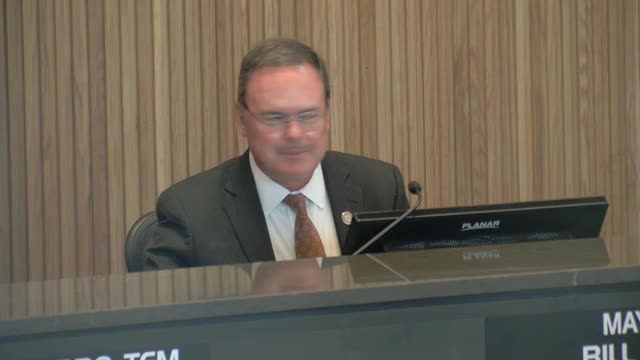McKinney council asks staff to develop options for trap-neuter-return program
October 06, 2025 | McKinney, Collin County, Texas
This article was created by AI summarizing key points discussed. AI makes mistakes, so for full details and context, please refer to the video of the full meeting. Please report any errors so we can fix them. Report an error »

Dax Bevely, a McKinney resident, urged the McKinney City Council to adopt a formal trap‑neuter‑return policy to reduce shelter intake and euthanasia and to stabilize feral cat colonies.
Hannah Golden, manager of the City of McKinney Animal Services department, told the council that TNR (trap, neuter, vaccinate, ear‑tip and return) targets unsocialized feral cats and can reduce reproduction and nuisance behavior when implemented comprehensively. Golden said current McKinney ordinances—definitions of ownership, restraint limits, public nuisance rules and rabies‑vaccination requirements—effectively prevent TNR as an authorized city practice today. “We do lend traps to residents,” Golden said, “but that trap becomes their cat.”
Golden presented regional approaches and tradeoffs. She said Dallas offers a broadly subsidized community‑cat program; Richardson returns feral cats to where they were found; Arlington has an established program; Plano has suspended TNR because of a panleukopenia outbreak; and Collin County does not allow TNR while offering barn‑cat adoption programs. Golden noted legal and practical constraints, including Texas rabies‑vaccination rules and the logistical and veterinary costs of spay/neuter and vaccination.
Council members asked about scope and costs. Councilman Rick Beller said a $100 per‑animal estimate sounded reasonable; Golden confirmed the program typically bundles spay/neuter with at least a rabies vaccination (and often FVRCP) and ear‑tipping to mark animals at the point of service. Council and staff discussed program models ranging from city‑run, subsidized clinics to a permissive ordinance that would allow residents and caretakers to conduct TNR without creating criminal exposure under the city code.
City Manager Phil Grimes said the immediate question for the council was whether staff should return with a menu of options. Multiple council members indicated support for further exploration. Grimes said staff (Animal Services and related departments) would return with options across the spectrum—definitions, ordinance language, cost estimates, and implementation approaches—recognizing that a Dallas‑style, city‑funded program would require new budget authority.
The council did not adopt an ordinance or formal rule at this meeting; instead staff was directed to bring back proposals for council consideration.
Golden and public commenters emphasized tradeoffs: TNR can reduce shelter intake and limit reproduction if conducted intensively during breeding seasons, but it requires sustained caretakers, veterinary capacity and funding; it also does not eliminate predation on wildlife or change natural hunting behavior.
Staff said any draft would address caretaker recognition, clear trap‑and‑release procedures, ear‑tipping, vaccination protocols, potential fee subsidies and whether the city would provide or contract surgical and vaccine services.
If council wishes to pursue a city‑funded program, staff noted that no funds are currently budgeted and a future budget adjustment or grant funding would be required.
Hannah Golden, manager of the City of McKinney Animal Services department, told the council that TNR (trap, neuter, vaccinate, ear‑tip and return) targets unsocialized feral cats and can reduce reproduction and nuisance behavior when implemented comprehensively. Golden said current McKinney ordinances—definitions of ownership, restraint limits, public nuisance rules and rabies‑vaccination requirements—effectively prevent TNR as an authorized city practice today. “We do lend traps to residents,” Golden said, “but that trap becomes their cat.”
Golden presented regional approaches and tradeoffs. She said Dallas offers a broadly subsidized community‑cat program; Richardson returns feral cats to where they were found; Arlington has an established program; Plano has suspended TNR because of a panleukopenia outbreak; and Collin County does not allow TNR while offering barn‑cat adoption programs. Golden noted legal and practical constraints, including Texas rabies‑vaccination rules and the logistical and veterinary costs of spay/neuter and vaccination.
Council members asked about scope and costs. Councilman Rick Beller said a $100 per‑animal estimate sounded reasonable; Golden confirmed the program typically bundles spay/neuter with at least a rabies vaccination (and often FVRCP) and ear‑tipping to mark animals at the point of service. Council and staff discussed program models ranging from city‑run, subsidized clinics to a permissive ordinance that would allow residents and caretakers to conduct TNR without creating criminal exposure under the city code.
City Manager Phil Grimes said the immediate question for the council was whether staff should return with a menu of options. Multiple council members indicated support for further exploration. Grimes said staff (Animal Services and related departments) would return with options across the spectrum—definitions, ordinance language, cost estimates, and implementation approaches—recognizing that a Dallas‑style, city‑funded program would require new budget authority.
The council did not adopt an ordinance or formal rule at this meeting; instead staff was directed to bring back proposals for council consideration.
Golden and public commenters emphasized tradeoffs: TNR can reduce shelter intake and limit reproduction if conducted intensively during breeding seasons, but it requires sustained caretakers, veterinary capacity and funding; it also does not eliminate predation on wildlife or change natural hunting behavior.
Staff said any draft would address caretaker recognition, clear trap‑and‑release procedures, ear‑tipping, vaccination protocols, potential fee subsidies and whether the city would provide or contract surgical and vaccine services.
If council wishes to pursue a city‑funded program, staff noted that no funds are currently budgeted and a future budget adjustment or grant funding would be required.
View full meeting
This article is based on a recent meeting—watch the full video and explore the complete transcript for deeper insights into the discussion.
View full meeting
